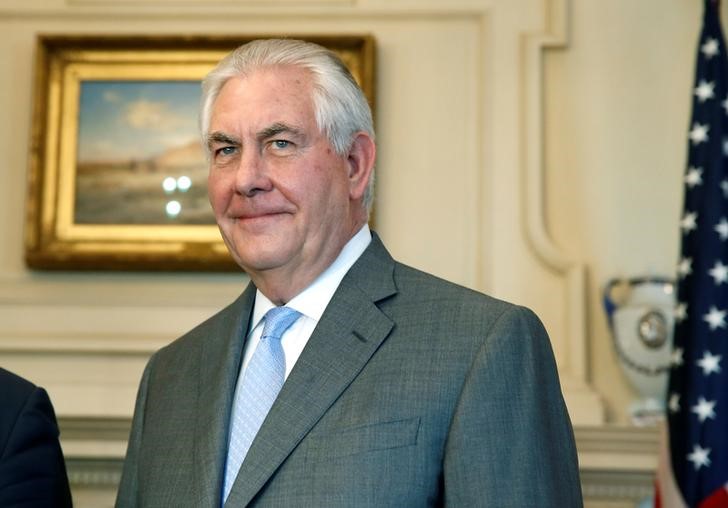WASHINGTON (Reuters) - U.S. Secretary of State Rex Tillerson has recused himself from issues related to TransCanada Corp's application for a permit for the Keystone XL pipeline, the State Department said in a letter on Thursday to the environmental group Greenpeace.
"He has not worked on that matter at the Department of State, and will play no role in the deliberations or ultimate resolution of TransCanada's application," said the letter from Katherine McManus, the State Department's deputy legal adviser.
McManus' letter came after Greenpeace wrote to officials at the State Department and the Office of Government Ethics on Wednesday, urging Tillerson recuse himself from any decisions on the multibillion-dollar pipeline, given his former role as chief executive officer of Exxon Mobil Corp (NYSE:XOM)..
Greenpeace argued in its letter that Exxon Mobil would "directly and predictably" benefit from the approval of Keystone XL because the firm has investments in Canadian oil sands.
Tillerson recused himself from the matter in early February, McManus wrote.
TransCanada tried for more than five years to build the 1,179-mile (1,897-km) pipeline, until President Barack Obama rejected it in 2015.
TransCanada resubmitted its application for the Keystone project in January, after Obama's White House successor, Donald Trump, signed an order smoothing its path.
The line is designed to link existing pipeline networks in Canada and the United States to bring crude from Alberta and North Dakota to refineries in Illinois en route to the Gulf of Mexico.
Exxon has a majority stake in Imperial Oil, a Calgary, -Alberta-based company that operates the Kearl oil sands project in northern Alberta.
"Exxon Mobil could benefit from the approval of the pipeline if it has specific contracts or agreements with TransCanada either to transport their Canadian tar sands production, or to receive such shipments at their U.S. refineries," Greenpeace wrote in its letter on Wednesday.
Tillerson wrote in a January letter to McManus that for one year after his resignation from Exxon Mobil, he "will not participate personally and substantially in any particular matter involving specific parties in which I know that Exxon Mobil is a party or represents a party, unless I am first authorized to participate."

He also wrote that "on a case-by-case basis," he would recuse himself "from participation in any particular matter involving specific parties in which I determine that a reasonable person with knowledge of the relevant facts would question my impartiality in the matter, unless I am first authorized to participate."